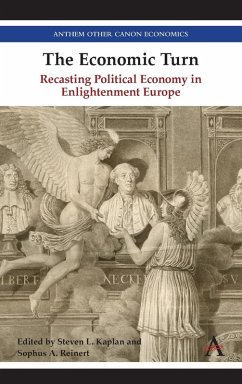The Economic Turn
Recasting Political Economy in Enlightenment Europe
Herausgeber: Kaplan, Steven; Reinert, Sophus
The Economic Turn
Recasting Political Economy in Enlightenment Europe
Herausgeber: Kaplan, Steven; Reinert, Sophus
- Gebundenes Buch
- Merkliste
- Auf die Merkliste
- Bewerten Bewerten
- Teilen
- Produkt teilen
- Produkterinnerung
- Produkterinnerung
'The Economic Turn' brings together many of the world's leading historians of early political economy to recast the very origins of the discipline in light of the Europe-wide critical reaction to the school of Enlightenment economic thought known as Physiocracy.
Andere Kunden interessierten sich auch für
![Slave Trade and the Economic Development of 18th-Century Lancaster Slave Trade and the Economic Development of 18th-Century Lancaster]() Melinda ElderSlave Trade and the Economic Development of 18th-Century Lancaster200,99 €
Melinda ElderSlave Trade and the Economic Development of 18th-Century Lancaster200,99 €![The Allied Occupation and Japan's Economic Miracle The Allied Occupation and Japan's Economic Miracle]() Bowen C. DeesThe Allied Occupation and Japan's Economic Miracle271,99 €
Bowen C. DeesThe Allied Occupation and Japan's Economic Miracle271,99 €![Female Agency in the Urban Economy Female Agency in the Urban Economy]() Female Agency in the Urban Economy206,99 €
Female Agency in the Urban Economy206,99 €![A Voyage Into the Levant A Voyage Into the Levant]() Joseph Pitton De TournefortA Voyage Into the Levant68,99 €
Joseph Pitton De TournefortA Voyage Into the Levant68,99 €![The Future Of The Southern Slavs (1917) The Future Of The Southern Slavs (1917)]() A. H. E. TaylorThe Future Of The Southern Slavs (1917)35,99 €
A. H. E. TaylorThe Future Of The Southern Slavs (1917)35,99 €![The Reformation In Sweden The Reformation In Sweden]() Clement Moore ButlerThe Reformation In Sweden32,99 €
Clement Moore ButlerThe Reformation In Sweden32,99 €![Lebanese Historical Thought in the Eighteenth Century Lebanese Historical Thought in the Eighteenth Century]() Hayat El Eid BualuanLebanese Historical Thought in the Eighteenth Century32,99 €
Hayat El Eid BualuanLebanese Historical Thought in the Eighteenth Century32,99 €-
-
-
'The Economic Turn' brings together many of the world's leading historians of early political economy to recast the very origins of the discipline in light of the Europe-wide critical reaction to the school of Enlightenment economic thought known as Physiocracy.
Hinweis: Dieser Artikel kann nur an eine deutsche Lieferadresse ausgeliefert werden.
Hinweis: Dieser Artikel kann nur an eine deutsche Lieferadresse ausgeliefert werden.
Produktdetails
- Produktdetails
- Verlag: Anthem Press
- Seitenzahl: 794
- Erscheinungstermin: 16. Januar 2019
- Englisch
- Abmessung: 235mm x 157mm x 51mm
- Gewicht: 1418g
- ISBN-13: 9781783088553
- ISBN-10: 1783088559
- Artikelnr.: 54978614
- Herstellerkennzeichnung
- Libri GmbH
- Europaallee 1
- 36244 Bad Hersfeld
- gpsr@libri.de
- Verlag: Anthem Press
- Seitenzahl: 794
- Erscheinungstermin: 16. Januar 2019
- Englisch
- Abmessung: 235mm x 157mm x 51mm
- Gewicht: 1418g
- ISBN-13: 9781783088553
- ISBN-10: 1783088559
- Artikelnr.: 54978614
- Herstellerkennzeichnung
- Libri GmbH
- Europaallee 1
- 36244 Bad Hersfeld
- gpsr@libri.de
Edited by Steven Kaplan and Sophus Reinert
Acknowledgments; Notes on Contributors; Chapter One The Economic Turn in
Enlightenment Europe, Steven L. Kaplan and Sophus A. Reinert; Chapter
TwoThe Physiocratic Movement: A Revision, Loïc Charles and Christine Théré;
Chapter Three The Political Economy of Colonization: From Composite
Monarchy to Nation, Paul Cheney; Chapter Four Against the Chinese Model:
The Debate on Cultural Facts and Physiocratic Epistemology, Stefan
Gaarsmand Jacobsen; Chapter Five "Le superfl u, chose très nécessaire":
Physiocracy and Its Discontents in the Eighteenth- Century Luxury Debate,
Michael Kwass; Chapter Six François Véron de Forbonnais and the Invention
of Antiphysiocracy, Loïc Charles and Arnaud Orain; Chapter Seven Between
Mercantilism and Physiocracy: Forbonnais's 'Est modus in Rebus' Vision,
Antonella Alimento; Chapter Eight Physiocrat Arithmetic versus Ratios : The
Analytical Economics of Jean- Joseph- Louis Graslin, Arnaud Orain; Chapter
Nine Galiani: Grain and Governance, Steven L. Kaplan; Chapter Ten "Live and
Die Proprietors and Free": Morellet Dismantles the Dialogues and Defends
the Radical Liberal Break, Steven L. Kaplan; Chapter Eleven "Is the Feeling
of Humanity not More Sacred than The Right of Property?": Diderot's
Antiphysiocracy in His Apology of Abbé Galiani, Steven L. Kaplan; Chapter
Twelve De facto Policies and Intellectual Agendas of an Eighteenth- Century
Milanese Agricultural Academy: Physiocratic Resonances in the Società
patriotica, Lavinia Maddaluno; Chapter Thirteen Sensationism, Modern
Natural Law and the "Science of Commerce" at the Heart of the Controversy
between Mably and the Physiocrats, Julie Ferrand and Arnaud Orain; Chapter
Fourteen 'One Must Make War on the Lunatics': The Physiocrats' Attacks on
Linguet, the Iconoclast (1767- 1775), Arnaud Orain; Chapter Fifteen The
Grain Question as the Social Question: Necker's Antiphysiocracy, Steven L.
Kaplan; Chapter Sixteen Physiocracy in Sweden: A Note on the Problem of
Inventing Tradition, Lars Magnusson; Chapter Seventeen Spain and the
Economic Work of Jacques Accarias de Serionne, Jesús Astigarraga; Chapter
Eighteen Captured by the Commercial Paradigm: Physiocracy Going Dutch, Ida
Nijenhuis; Chapter Nineteen Cameralism, Physiocracy and Antiphysiocracy in
the Germanies, Andre Wakefield; Chapter Twenty No Way Back to Quesnay:
Say's Opposition to Physiocracy, Philippe Steiner; Chapter Twenty-One "A
Sublimely Stupid Idea": Physiocracy in Italy from the Enlightenment to
Fascism, Sophus A. Reinert; Chapter Twenty-Two Epilogue: Political Economy
and the Social, Steven L. Kaplan and Sophus A. Reinert; Index.
Enlightenment Europe, Steven L. Kaplan and Sophus A. Reinert; Chapter
TwoThe Physiocratic Movement: A Revision, Loïc Charles and Christine Théré;
Chapter Three The Political Economy of Colonization: From Composite
Monarchy to Nation, Paul Cheney; Chapter Four Against the Chinese Model:
The Debate on Cultural Facts and Physiocratic Epistemology, Stefan
Gaarsmand Jacobsen; Chapter Five "Le superfl u, chose très nécessaire":
Physiocracy and Its Discontents in the Eighteenth- Century Luxury Debate,
Michael Kwass; Chapter Six François Véron de Forbonnais and the Invention
of Antiphysiocracy, Loïc Charles and Arnaud Orain; Chapter Seven Between
Mercantilism and Physiocracy: Forbonnais's 'Est modus in Rebus' Vision,
Antonella Alimento; Chapter Eight Physiocrat Arithmetic versus Ratios : The
Analytical Economics of Jean- Joseph- Louis Graslin, Arnaud Orain; Chapter
Nine Galiani: Grain and Governance, Steven L. Kaplan; Chapter Ten "Live and
Die Proprietors and Free": Morellet Dismantles the Dialogues and Defends
the Radical Liberal Break, Steven L. Kaplan; Chapter Eleven "Is the Feeling
of Humanity not More Sacred than The Right of Property?": Diderot's
Antiphysiocracy in His Apology of Abbé Galiani, Steven L. Kaplan; Chapter
Twelve De facto Policies and Intellectual Agendas of an Eighteenth- Century
Milanese Agricultural Academy: Physiocratic Resonances in the Società
patriotica, Lavinia Maddaluno; Chapter Thirteen Sensationism, Modern
Natural Law and the "Science of Commerce" at the Heart of the Controversy
between Mably and the Physiocrats, Julie Ferrand and Arnaud Orain; Chapter
Fourteen 'One Must Make War on the Lunatics': The Physiocrats' Attacks on
Linguet, the Iconoclast (1767- 1775), Arnaud Orain; Chapter Fifteen The
Grain Question as the Social Question: Necker's Antiphysiocracy, Steven L.
Kaplan; Chapter Sixteen Physiocracy in Sweden: A Note on the Problem of
Inventing Tradition, Lars Magnusson; Chapter Seventeen Spain and the
Economic Work of Jacques Accarias de Serionne, Jesús Astigarraga; Chapter
Eighteen Captured by the Commercial Paradigm: Physiocracy Going Dutch, Ida
Nijenhuis; Chapter Nineteen Cameralism, Physiocracy and Antiphysiocracy in
the Germanies, Andre Wakefield; Chapter Twenty No Way Back to Quesnay:
Say's Opposition to Physiocracy, Philippe Steiner; Chapter Twenty-One "A
Sublimely Stupid Idea": Physiocracy in Italy from the Enlightenment to
Fascism, Sophus A. Reinert; Chapter Twenty-Two Epilogue: Political Economy
and the Social, Steven L. Kaplan and Sophus A. Reinert; Index.
Acknowledgments; Notes on Contributors; Chapter One The Economic Turn in
Enlightenment Europe, Steven L. Kaplan and Sophus A. Reinert; Chapter
TwoThe Physiocratic Movement: A Revision, Loïc Charles and Christine Théré;
Chapter Three The Political Economy of Colonization: From Composite
Monarchy to Nation, Paul Cheney; Chapter Four Against the Chinese Model:
The Debate on Cultural Facts and Physiocratic Epistemology, Stefan
Gaarsmand Jacobsen; Chapter Five "Le superfl u, chose très nécessaire":
Physiocracy and Its Discontents in the Eighteenth- Century Luxury Debate,
Michael Kwass; Chapter Six François Véron de Forbonnais and the Invention
of Antiphysiocracy, Loïc Charles and Arnaud Orain; Chapter Seven Between
Mercantilism and Physiocracy: Forbonnais's 'Est modus in Rebus' Vision,
Antonella Alimento; Chapter Eight Physiocrat Arithmetic versus Ratios : The
Analytical Economics of Jean- Joseph- Louis Graslin, Arnaud Orain; Chapter
Nine Galiani: Grain and Governance, Steven L. Kaplan; Chapter Ten "Live and
Die Proprietors and Free": Morellet Dismantles the Dialogues and Defends
the Radical Liberal Break, Steven L. Kaplan; Chapter Eleven "Is the Feeling
of Humanity not More Sacred than The Right of Property?": Diderot's
Antiphysiocracy in His Apology of Abbé Galiani, Steven L. Kaplan; Chapter
Twelve De facto Policies and Intellectual Agendas of an Eighteenth- Century
Milanese Agricultural Academy: Physiocratic Resonances in the Società
patriotica, Lavinia Maddaluno; Chapter Thirteen Sensationism, Modern
Natural Law and the "Science of Commerce" at the Heart of the Controversy
between Mably and the Physiocrats, Julie Ferrand and Arnaud Orain; Chapter
Fourteen 'One Must Make War on the Lunatics': The Physiocrats' Attacks on
Linguet, the Iconoclast (1767- 1775), Arnaud Orain; Chapter Fifteen The
Grain Question as the Social Question: Necker's Antiphysiocracy, Steven L.
Kaplan; Chapter Sixteen Physiocracy in Sweden: A Note on the Problem of
Inventing Tradition, Lars Magnusson; Chapter Seventeen Spain and the
Economic Work of Jacques Accarias de Serionne, Jesús Astigarraga; Chapter
Eighteen Captured by the Commercial Paradigm: Physiocracy Going Dutch, Ida
Nijenhuis; Chapter Nineteen Cameralism, Physiocracy and Antiphysiocracy in
the Germanies, Andre Wakefield; Chapter Twenty No Way Back to Quesnay:
Say's Opposition to Physiocracy, Philippe Steiner; Chapter Twenty-One "A
Sublimely Stupid Idea": Physiocracy in Italy from the Enlightenment to
Fascism, Sophus A. Reinert; Chapter Twenty-Two Epilogue: Political Economy
and the Social, Steven L. Kaplan and Sophus A. Reinert; Index.
Enlightenment Europe, Steven L. Kaplan and Sophus A. Reinert; Chapter
TwoThe Physiocratic Movement: A Revision, Loïc Charles and Christine Théré;
Chapter Three The Political Economy of Colonization: From Composite
Monarchy to Nation, Paul Cheney; Chapter Four Against the Chinese Model:
The Debate on Cultural Facts and Physiocratic Epistemology, Stefan
Gaarsmand Jacobsen; Chapter Five "Le superfl u, chose très nécessaire":
Physiocracy and Its Discontents in the Eighteenth- Century Luxury Debate,
Michael Kwass; Chapter Six François Véron de Forbonnais and the Invention
of Antiphysiocracy, Loïc Charles and Arnaud Orain; Chapter Seven Between
Mercantilism and Physiocracy: Forbonnais's 'Est modus in Rebus' Vision,
Antonella Alimento; Chapter Eight Physiocrat Arithmetic versus Ratios : The
Analytical Economics of Jean- Joseph- Louis Graslin, Arnaud Orain; Chapter
Nine Galiani: Grain and Governance, Steven L. Kaplan; Chapter Ten "Live and
Die Proprietors and Free": Morellet Dismantles the Dialogues and Defends
the Radical Liberal Break, Steven L. Kaplan; Chapter Eleven "Is the Feeling
of Humanity not More Sacred than The Right of Property?": Diderot's
Antiphysiocracy in His Apology of Abbé Galiani, Steven L. Kaplan; Chapter
Twelve De facto Policies and Intellectual Agendas of an Eighteenth- Century
Milanese Agricultural Academy: Physiocratic Resonances in the Società
patriotica, Lavinia Maddaluno; Chapter Thirteen Sensationism, Modern
Natural Law and the "Science of Commerce" at the Heart of the Controversy
between Mably and the Physiocrats, Julie Ferrand and Arnaud Orain; Chapter
Fourteen 'One Must Make War on the Lunatics': The Physiocrats' Attacks on
Linguet, the Iconoclast (1767- 1775), Arnaud Orain; Chapter Fifteen The
Grain Question as the Social Question: Necker's Antiphysiocracy, Steven L.
Kaplan; Chapter Sixteen Physiocracy in Sweden: A Note on the Problem of
Inventing Tradition, Lars Magnusson; Chapter Seventeen Spain and the
Economic Work of Jacques Accarias de Serionne, Jesús Astigarraga; Chapter
Eighteen Captured by the Commercial Paradigm: Physiocracy Going Dutch, Ida
Nijenhuis; Chapter Nineteen Cameralism, Physiocracy and Antiphysiocracy in
the Germanies, Andre Wakefield; Chapter Twenty No Way Back to Quesnay:
Say's Opposition to Physiocracy, Philippe Steiner; Chapter Twenty-One "A
Sublimely Stupid Idea": Physiocracy in Italy from the Enlightenment to
Fascism, Sophus A. Reinert; Chapter Twenty-Two Epilogue: Political Economy
and the Social, Steven L. Kaplan and Sophus A. Reinert; Index.








